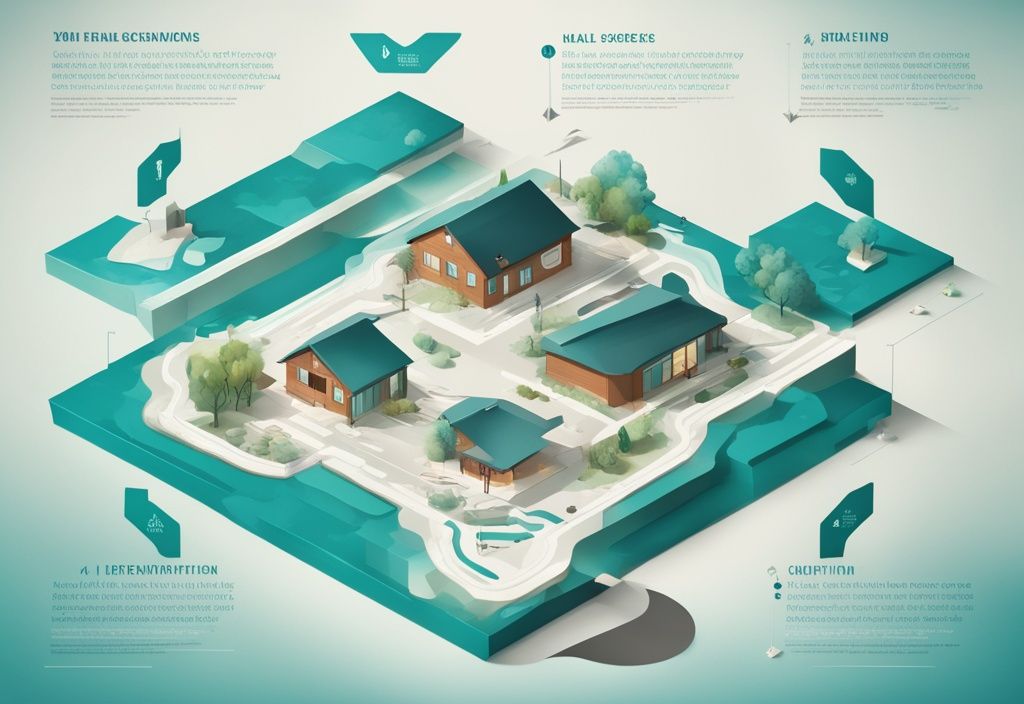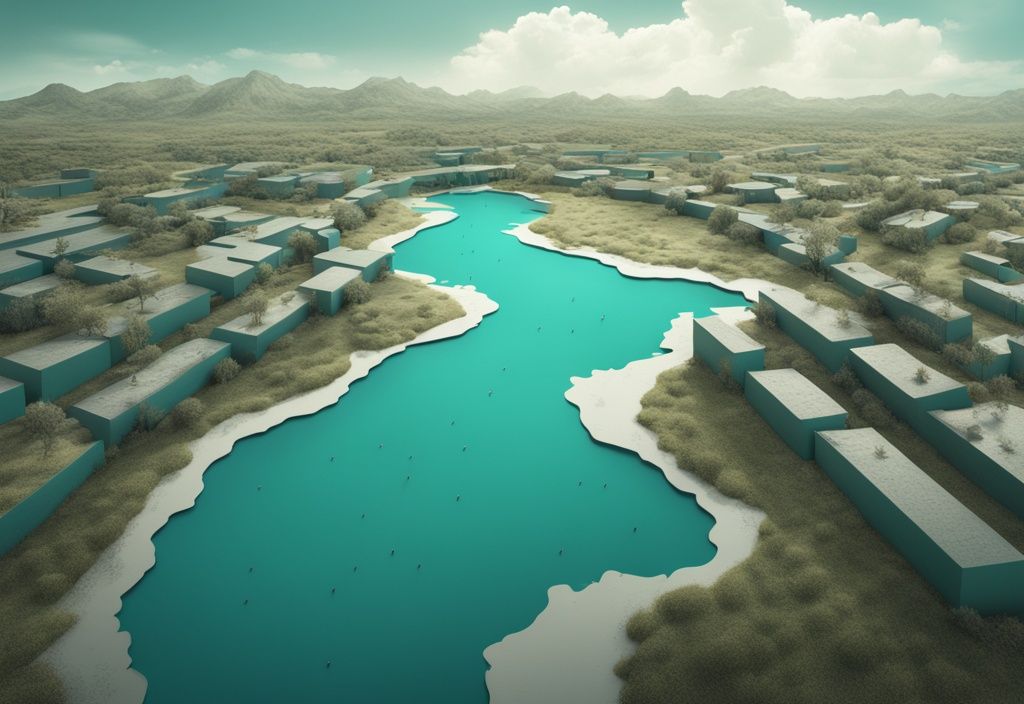
Ever wondered what is accretion in real estate and how it could impact your property investments? As an experienced real estate expert, I must tell you, it’s a game-changer. Accretion, a natural process that results in the gradual increase of land along coastlines, can shape your property boundaries, ownership rights, and ultimately, the value of your investment.
Our journey today will delve into the nuts and bolts of accretion in real estate, shedding light on its legal aspects and practical considerations for effective property management. So why does this matter to you? With several coastal cities booming, understanding accretion could give you an upper hand in your real estate pursuits.
Stick around! By the end of this article, you’ll be ready to navigate the ever-changing landscape of coastal real estate with confidence, using accretion to your advantage.
The Basics of Accretion in Real Estate
When we talk about accretion in real estate, we’re delving into a fascinating natural process that changes the landscape over time. The following sections will explore what accretion is and its different forms, giving you a comprehensive understanding of this phenomenon.
The Concept of Accretion
So, what is accretion in real estate? Accretion refers to the gradual increase of land area due to the deposition of sediment along a shoreline. Picture this: over time, water currents carry soil, sand, or other sediments to a particular location, where they settle and slowly form new land. This process can often be observed near rivers, lakes, and oceans.
Did you know that the term ‘accretion’ actually stems from the Latin word ‘accretio,’ meaning ‘increase’ or ‘addition’? It’s a fitting term, given how this natural process adds to the existing landmass incrementally. Imagine standing by a lakeshore over the years and watching the land extend outward bit by bit—that’s accretion in action!
Types of Accretion: Natural vs. Artificial
Accretion isn’t just a one-size-fits-all process; it can happen both naturally and through human intervention. Natural accretion is quite remarkable, as it’s entirely driven by nature. Think about how soil, sand, or sediment gets naturally deposited along shorelines and riverbanks over time. Water currents play a crucial role here, transporting these materials and allowing them to accumulate, expanding the land area gradually.
But not all accretion is left to nature’s whim. Artificial accretion, on the other hand, involves deliberate human actions that lead to land formation. For example, activities like dredging, which involves removing sediment from one location and depositing it in another, can create new land. Similarly, constructing breakwaters or other structures can encourage sediment to build up in specific areas.
Both natural and artificial accretion result in the expansion of land, but they do so through distinctly different means—one driven by nature’s pace, and the other by human effort. Whether it’s the slow, steady work of water currents or a planned construction project, accretion shapes the landscapes in ways that can have significant implications for real estate.
How Accretion Happens
Accretion in real estate is a fascinating natural phenomenon where sediment carried by water currents gradually builds up along shorelines. This process can increase the size of land parcels next to bodies of water like rivers, lakes, and oceans. Picture this: tiny particles of soil, sand, and other materials being swept along by the water’s steady movement. Over time, these materials settle and accumulate, forming new land. This slow and continuous buildup can be a real boon for property owners, as it allows the landscape to expand naturally.
The Process Broken Down
Let’s delve into how this happens step by step. Imagine standing by a river, observing how water currents carry bits of sediment. These sediments, often comprising fine materials like silt and sand, are prone to deposition along the shore. As the current flows, it loses momentum close to the land, causing the sediment to drop and settle.
Now, consider that this process isn’t instantaneous. It unfolds over years, sometimes decades, lending a subtle yet impactful change to the shoreline. Eventually, what was once water becomes solid ground, thanks to the relentless work of nature.
Factors That Influence Accretion
Several elements play a role in this intriguing process:
- Sediment Availability and Type: The kind and amount of sediment in the water can significantly dictate how much and how quickly land builds up. Finer materials like silt and sand are the star players here, thanks to their tendency to deposit along shores.
- Water Current Strength and Direction: Ever noticed how a stronger current can carry leaves farther down a stream? Similarly, stronger water currents can carry more sediment and deposit it more effectively along the shore. The direction of these currents also influences where the sediment will finally settle.
- Natural Events Like Storms and Floods: Think of these events as nature’s way of fast-tracking accretion. Storms and floods can suddenly introduce large amounts of sediment into the water, accelerating the deposition process and often leading to noticeable changes in land size in a shorter span of time.
- Human Activities: Humans aren’t merely passive observers in this natural dance. Activities such as dredging, constructing breakwaters, or other modifications to water flow can significantly impact sediment deposition. These actions can either speed up or slow down the natural accretion process by altering how water and sediment interact with the shoreline.
By understanding these factors, property owners and real estate developers can better anticipate changes and harness the potential benefits of accretion. Got a waterfront property? Keep an eye out—you might just find nature gifting you a bit more land over the years.

Importance of Accretion to Property Ownership and Value
Accretion in real estate is a natural process that can have substantial benefits and legal considerations for property owners. From increasing land size and value to navigating local laws, understanding accretion is crucial for maximizing property potential. Let’s delve into how accretion impacts property ownership and its value.
How Accretion Increases Land and Value
Accretion can significantly benefit landowners by increasing the size of their property through the natural deposition of soil, sand, or sediment along shorelines or riverbanks. This process, known as accretion in real estate, can lead to a notable rise in property value because the expanded land area presents more opportunities for development and investment.
Imagine owning a waterfront property and waking up one day to realize you have more land than you did last year. The newly formed land generally becomes part of the adjacent property, allowing you to see your property’s total size and potential use expand without additional purchases. Consequently, property value appreciates, offering higher returns on investments and more flexible use of the land. Isn’t that an enticing prospect?
The Legality of Owning Accreted Land
The ownership of accreted land hinges primarily on local laws and regulations, which may vary widely. Typically, the landowner whose property abuts the water body where accretion occurs gains rights to this newly formed land. This process is straightforward and beneficial in most cases, adding significant value to the adjacent property.
However, it’s not always sunshine and roses. In some jurisdictions, specific laws may stipulate that newly formed land belongs to the state or public authorities. Imagine expecting to gain new land only to find out it’s not yours—quite the letdown! Therefore, landowners should be well-acquainted with local legal frameworks to understand their rights and any potential challenges or disputes that may arise concerning the ownership of accreted land.
Environmental and Zoning Laws in Accretion
Environmental regulations play a crucial role in determining the ownership and permissible uses of accreted land. These laws can impact how the newly formed land can be utilized, often imposing restrictions to protect natural habitats and maintain ecological balance.
Zoning laws also come into play, potentially limiting development and dictating specific land uses to align with community planning and environmental preservation efforts. For instance, you might think about building that dream lakeside gazebo, only to find out local zoning laws restrict such construction.
Property owners need to thoroughly navigate local regulations to understand their rights, obligations, and any restrictions tied to accreted lands. Adhering to these laws ensures compliance and helps avoid legal conflicts while responsibly managing and optimizing the use of accreted lands.
Legal Understanding of Accretion
To understand what is accretion in real estate, we must delve into the intertwined legal facets that govern it. In this section, we’ll explore the crucial concepts like riparian rights and the differentiation between accretion and other land changes. We’ll also touch upon the substantial legal challenges that often emerge due to accretion.
Riparian Rights: A Key to Accretion
Riparian rights are a cornerstone concept for grasping what is accretion in real estate; you can learn more about this important legal framework regarding water rights and property ownership here. If you own land adjacent to water bodies, these rights become particularly significant. Riparian rights essentially grant you the entitlement to the natural accumulation of land through sediment deposition.
Picture this: you own a lakeside property and over the years, you notice new land forming naturally. Riparian rights mean that you can claim this new land, support structure constructions, and manage it effectively. So, having a firm grip on these rights isn’t just helpful—it’s indispensable. It empowers you to make informed decisions about your property, ensuring you can legally benefit from the advantages that come with accretion.
Accretion vs. Other Land Changes
Distinguishing accretion from other natural land changes is pivotal. When talking about what is accretion in real estate, think of it as the gradual gain of land due to sediment being deposited over time.
On the other hand, reliction is quite different. This happens when water levels recede, uncovering land that was previously underwater. Erosion, meanwhile, refers to the gradual loss of land as soil wears away, often causing property valuation concerns.
But then there’s avulsion, a rapid alteration of land typically spurred by natural disasters like hurricanes. Unlike accretion’s slow and steady process, avulsion can dramatically change property boundaries overnight. Knowing these distinctions can help you fully grasp your legal and environmental standing.
The Legal Challenges of Accretion
Accretion often introduces legal complexities, especially regarding changes in land area. Imagine discovering new land forming next to your property—this could easily lead to disputes over new property boundaries.
Contentious situations might arise with your neighbors as you establish new boundaries. When new land appears between existing properties, questions about rightful ownership can lead to legal wrangles.
Keeping well-maintained legal frameworks and accurate property surveys is vital. These tools can help you navigate potential disputes and understand what is accretion in real estate, ensuring you can anticipate and manage these challenges effectively.

Understanding the nuanced legal aspects of accretion doesn’t just prepare you for potential disputes—it empowers you to make confident, informed decisions about your property.
What is Accretion in Real Estate
Accretion in real estate refers to the gradual increase of land due to natural sediment deposition along shorelines. This process can significantly impact property boundaries, investment opportunities, and even insurance and financing terms.
Accretion’s Effect on Property Boundaries
Accretion, or the natural build-up of land, can really shake things up when it comes to property boundaries. Imagine owning a lovely piece of shoreline property; suddenly, over the years, more land starts to form. Sounds great, right? Well, it can be!
But with new land comes new responsibilities. Property lines may extend, so keeping those boundaries updated in official land records becomes crucial to avoid legal squabbles. You’ll find regular surveys indispensable for making sure these new borders are spot-on. Trust me, it’s a lot better to clear things up with neighbors before any disputes arise.
Keeping up with these changes is essential. Accurate, updated surveys can document these transformations over time, keeping everyone on the same page. More land often means an increase in property value, giving you a potentially lucrative investment bump.
Investment Opportunities Because of Accretion
Accretion can be a goldmine for real estate developers and investors. Areas prone to this natural occurrence can offer expansive parcels of waterfront property that were initially uncharted, driving up market values considerably.
Think about it: these newly formed lands are in prime real estate spots near water. Imagine turning that fresh stretch of beachfront into a high-end residential development or a dreamy resort. The possibilities are endless.
Smart management of accreted land can yield fantastic financial returns. Savvy investors will seize the opportunity to expand their portfolios and enhance the value of existing properties. Incorporating these lands into development plans can pay off in the long run.
How Accretion Impacts Your Insurance and Financing
Accretion doesn’t just change your property; it also impacts your insurance and financing. As your land grows, your property insurance needs to be reassessed. You want to make sure the new area is adequately covered, right? Insurance premiums could adjust, so keeping your insurer in the loop is vital.
And let’s not forget about financing. Lenders will likely revalue your property when considering loans or refinancing, thanks to that new expanse of land. This means loan terms could shift in your favor, reflecting the increased collateral value.
To navigate these changes smoothly, property owners should proactively communicate with both insurers and financial institutions. It’s all about securing comprehensive coverage and favorable financing terms as your property evolves with accretion.

Accretion Across Different Jurisdictions
U.S. East Coast vs. West Coast Accretion Laws
Understanding what is accretion in real estate involves recognizing that laws differ significantly between the U.S. East Coast and West Coast. If you’re wondering, you might also want to know: is wholesaling real estate legal on the West Coast? The East Coast adheres to the Riparian Doctrine, which grants landowners rights to both water and land changes. Imagine owning a property next to a river; you could legally claim any land that builds up over time due to natural processes like sediment deposition. This often boosts the property value because your land area increases.
On the flip side, the West Coast primarily follows the Doctrine of Prior Appropriation. Here, water rights are based on historical usage, not just proximity to the water. Simply put, if you haven’t historically used the water source nearby, you might not automatically gain rights to the new land created by accretion. This means that property rights can be quite different, with East Coast properties often seeing a value boost from accretion, while West Coast properties tie their value more to how the water rights have been used historically.
Local Accretion Laws to Consider
The local regulations governing what is accretion in real estate can be complex and vary widely. These laws determine property rights and boundaries, making it crucial for stakeholders to understand their legal framework. Local accretion laws influence land ownership disputes and property value by setting forth how accreted land is allocated and utilized.
Property owners, developers, and buyers need to be well-informed about these regulations. Imagine investing in a piece of land only to find out later that accreted land doesn’t automatically belong to you. In some places, the accreted land transfers ownership to the adjacent property owner by default. In others, it might be allocated differently, which could significantly impact your investment strategies and legal considerations.
Navigating these local regulations expertly can prevent legal disputes and maximize the potential benefits of accreted lands. To successfully manage properties affected by accretion, you need to understand not only what is accretion in real estate but also how local laws apply to specific scenarios. This ensures proper land use, legal compliance, and enhanced property value.
Conclusion
Recognizing the impact of accretion in real estate is essential for understanding property dynamics, particularly if you own land near a body of water. With over 15 years in real estate, I’ve seen firsthand how natural sediment build-up or human-induced changes can subtly but significantly alter property size and value.
Comprehending what is accretion in real estate starts with grasping its gradual process. Imagine your property slowly gaining new land as sediments accumulate. Noticed an increase in your yard size recently? For those interested in how this might affect property values, exploring opportunities in the middle market real estate sector can provide valuable insights. That could be accretion at work.
However, don’t overlook the legal complexities. Local laws and regulations vary, and often, property owners do gain ownership of the new land. Yet, the specific legalities can present challenges. Knowing these rules and understanding riparian rights—who owns what along the water—can make all the difference.
For real estate agents and investors, keeping abreast of accretion is crucial. Isn’t it appealing to think that an enlarged land area could boost your property’s value and your investment returns? It’s possible, provided environmental and zoning laws are respected. Regularly update your property boundaries and conduct surveys to stay ahead of any disputes and maximize your investment.
Accretion in real estate might seem complex, but mastering its nuances can yield substantial benefits. Stay engaged with local regulations and be mindful of the environmental impacts. This diligence ensures your property management and development efforts remain compliant and profitable.
Understanding accretion in real estate is truly an invaluable asset. In today’s ever-changing property landscape, staying informed and proactive can enhance both your confidence and your bottom line.
Accretion FAQs
What Exactly is Accretion in Real Estate?
Accretion in real estate is the gradual increase of land due to natural processes, specifically the deposition of sediment along shorelines by water currents. You often see this phenomenon near rivers, lakes, and oceans. Over time, these sediment deposits can result in an expanded land area adjacent to these water bodies.
Why Does Accretion Increase Property Value?
Accretion increases property value by enlarging the land area, offering higher potential for development and investment. As the land area expands, property owners benefit from an increase in their total property size. This boost in land size can significantly enhance the overall value and potential returns from their investment.
Who Has the Rights on Accreted Land?
Typically, the property owner adjacent to the water body where accretion occurs gains ownership of the accreted land. However, you should be aware that this can vary depending on local laws and regulations. In some areas, jurisdictions may assign ownership to the state or public entities, so it’s essential to check local ordinances.
How do Accretion and Erosion Differ?
Accretion and erosion are contrasting geological processes. Accretion refers to the gradual gain of land due to sediment buildup. On the flip side, erosion involves the gradual loss of land as soil and rock are worn away by natural forces like water and wind. Recognizing the difference can help in understanding the changing landscape dynamics of your property.
Does Accretion Result in Legal Disputes?
Yes, accretion can lead to legal disputes concerning new property boundaries and ownership rights. As new land forms, property owners may face complications in determining rightful ownership. Often, resolving these issues requires a solid legal framework and accurate surveys to establish clear property lines and ownership.





